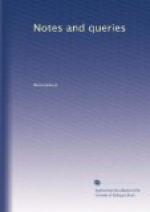J.S.B.
* * * * *
MISCELLANIES.
Darkness at the Crucifixion.—The following passage, in a volume of Lectures by the Rev. H. Blunt, has fallen under my notice:—
“It was this Dionysius (the Areopagite) of whom the earliest Christian historians relate that, being at Heliopolis, in Egypt, at the time of our Lord’s crucifixion, when he beheld the mid-day darkness which attended that awful event, he exclaimed, ’Either the God of Nature suffers, or the frame of the world will be dissolved.’”
Having very limited opportunity of studying the ancient historians, I should be greatly obliged if you would inform me from what work this account is derived; or refer me to any authors, not having embraced Christianity, who give a description of the crucifixion of our Saviour; and especially with reference to the “darkness over all the earth” at the time of that event, mentioned by St. Luke, who also adds, that “the sun was darkened.” Your kindly consenting, as you did in your second number, to receive queries respecting references, has induced me to trouble you so far.
S.A.M.
[Our correspondent will find much that is to his purpose, both in the way of statements and of reference {187} to original authorities, in Lardner’s Jewish and Heathen Testimonies, chap. xiii. of the Heathen Authors; vol. ii. p. 125. of the original 4to. edition; or vol. vii. p. 370. of the 8vo. edition of his works by Kippis, 1788.]
High-Doctrine.—In the Cambridgeshire fens there are a great number of Dissenters, and I believe Cromwell’s Ironsides were chiefly recruited from those districts. On the higher lands adjoining are the old parish churches; and in conversation it is not uncommon to hear the tenets of the Church of England described as High land Doctrine, in contra-distinction to the Low land, or Dissenters’ doctrine.
The thing is amusing, if nothing else, and I heard it while staying some few years ago with my brother, who lives on the edges of the Cambridgeshire fens.
E.H.
Wife of Robert de Bruce.—In the Surrenden Collection is an interesting roll, entitled “Liberatio facta Ingelardo de Warlee Custodi Garderobe, 7 E. 2.”
It is, as its title imports, the release to the keeper of the wardrobe, for one year’s accounts, a. 7 E. 2.
I shall probably be able to send you therefrom a few “notes” illustrative of the history of that time.
As a commencement, I think that the subjoined “note” will interest your historical readers.
It appears that the unfortunate wife of Robert Bruce was then consigned to the care of the Abbess of Barking, with an allowance of 20s. per week for the same. She was, I believe, the daughter of Henry de Burgh, Earl of Ulster, and died in 1328. In the above roll there is the following entry:—




